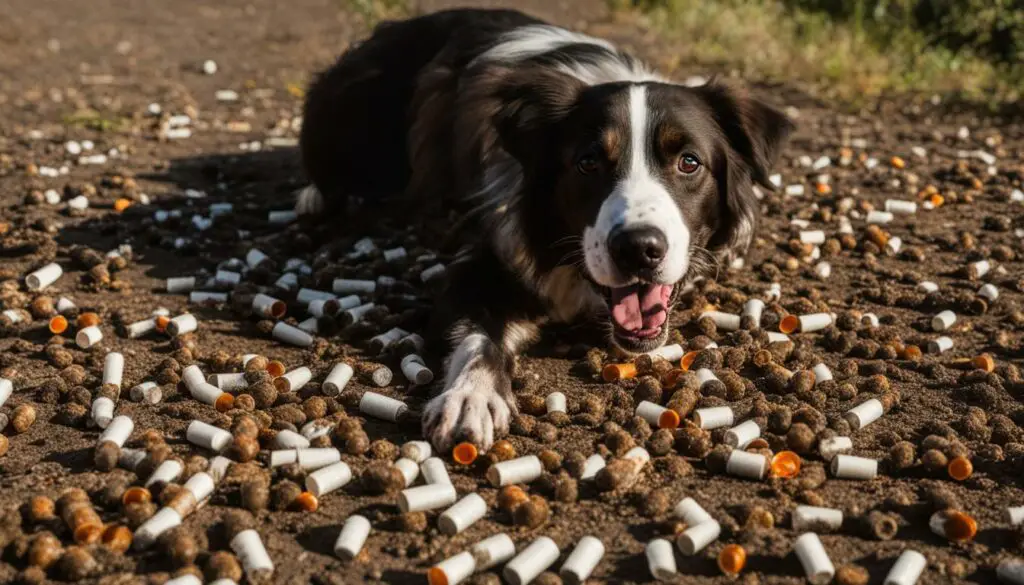If your dog has ingested rat poison, it’s crucial to act quickly to protect their health. Contact Poison Control immediately at 1-800-222-1222 or use the webPOISONCONTROL® online tool for expert and confidential guidance. In case of collapse, difficulty breathing, seizures, or unresponsiveness, call 911. Prompt professional assistance is vital in these situations.
Key Takeaways:
- Act quickly and contact Poison Control or emergency veterinary services if your dog ingests rat poison.
- Provide necessary information about the type of poison ingested to obtain accurate guidance and treatment.
- Pet-proof your home and take preventive measures to minimize the risk of rat poison exposure.
- Consider obtaining dog insurance to provide financial protection for unexpected accidents or illnesses.
- Partner with reliable resources for expert advice to ensure the best possible outcome for your dog’s health.
Signs of Rat Poison Ingestion in Dogs
If your dog has consumed rat poison, it’s important to be aware of the signs of ingestion. While immediate symptoms may not be apparent, it’s crucial to be vigilant and watch for any changes in your dog’s behavior and physical condition. Here are some common signs of rat poison ingestion in dogs:
- Lethargy: Your dog may appear tired, weak, or less active than usual.
- Pale gums: Check your dog’s gums to see if they are paler than normal, which could indicate anemia.
- Lack of appetite: If your dog suddenly loses interest in food or refuses to eat, it could be a sign of poisoning.
- Muscle weakness: Notice if your dog has difficulty standing, walking, or seems unsteady on their feet.
- Coordination issues: Pay attention to any stumbling, lack of coordination, or loss of balance.
- Vomiting: Excessive vomiting or the presence of blood in vomit can be a symptom of poisoning.
- Increased thirst: If your dog is drinking more water than usual, it may be a response to the toxicity.
- Seizures: Seizures or convulsions can occur in severe cases of rat poison ingestion.
- Paralysis: In some instances, dogs may experience paralysis or difficulty moving.
It’s important to note that these symptoms may not appear immediately after ingestion and can take anywhere from a day to a week to manifest. If you suspect your dog has ingested rat poison or notice any of these signs, it’s crucial to seek immediate veterinary care to ensure the best possible outcome for your pet’s health.
Additional Resources:
If you’re concerned about rat poison ingestion or need further guidance, there are resources available to help. Consider reaching out to:
Poison Control: Contact Poison Control immediately at 1-800-222-1222 or use the webPOISONCONTROL® online tool for expert and confidential advice.
Remember, early detection and prompt veterinary intervention are key in cases of rat poison ingestion. By staying vigilant and seeking professional assistance, you can help protect your dog’s health and well-being.
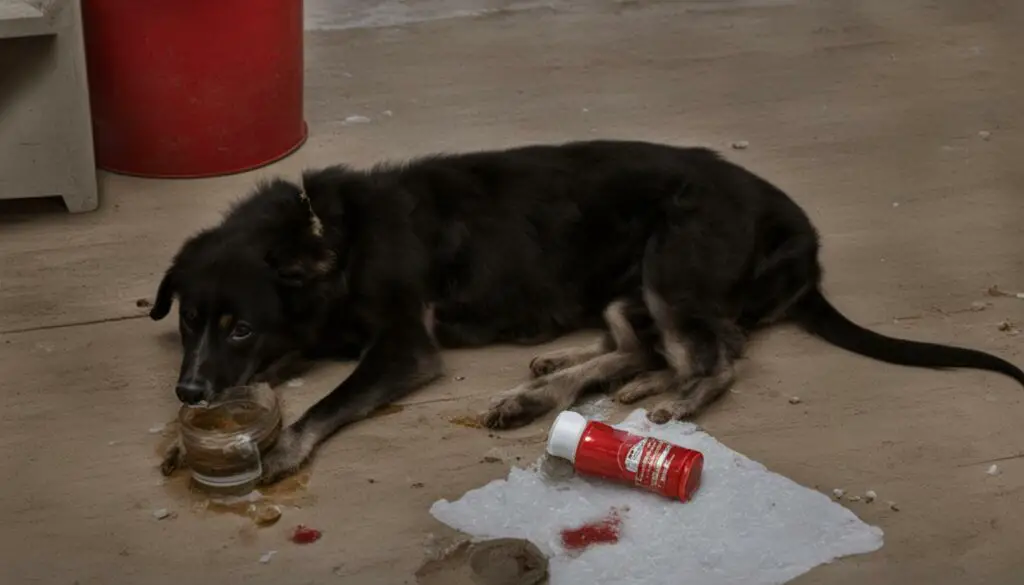
Types of Rat Poisons and Their Effects on Dogs
When a dog ingests rat poison, the type of poison and its effects can vary. It’s important to understand the different types of rat poisons and their potential impact on dogs. Here are some common types of rat poisons and their effects:
Anticoagulant Rodenticides
Anticoagulant rodenticides, such as brodifacoum and warfarin, are commonly used to kill rats and mice. These poisons interfere with blood clotting and can lead to internal bleeding in dogs. Symptoms may include lethargy, weakness, pale gums, difficulty breathing, and blood in the urine or feces.
Cholecalciferol (Vitamin D3)
Cholecalciferol-based rat poisons are highly toxic to dogs. These poisons increase calcium levels in the body, causing damage to organs like the kidneys, heart, and gastrointestinal system. Symptoms may include increased thirst, vomiting, loss of appetite, weakness, and excessive urination.
Bromethalin
Bromethalin is another type of rat poison that can be harmful to dogs. It causes swelling in the brain, leading to symptoms like seizures, tremors, muscle twitching, and paralysis. It’s important to seek immediate veterinary care if your dog ingests this type of poison.
Zinc and Aluminum Phosphides
Zinc and aluminum phosphides are used in certain rat poisons and release toxic gases in the stomach when ingested. This can lead to symptoms such as bloating, abdominal pain, difficulty breathing, and liver damage. Dogs who have ingested these poisons require immediate veterinary attention.
It’s crucial to remember that these are just a few examples of the types of rat poisons and their effects on dogs. If you suspect that your dog has ingested rat poison, it’s essential to contact a veterinarian or a poison control center immediately for guidance and professional assistance.
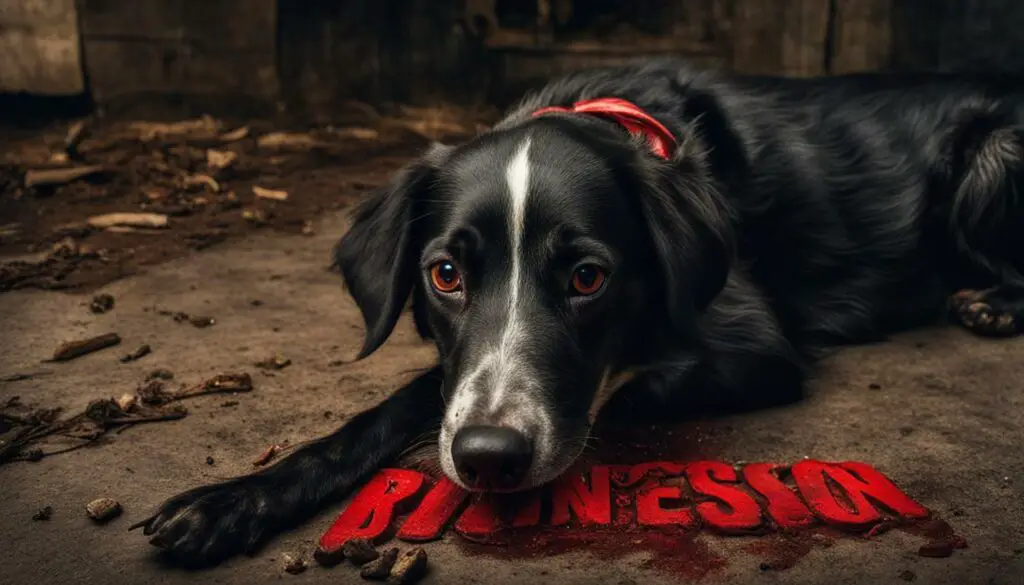
table {
width: 100%;
border-collapse: collapse;
margin-top: 20px;
}
th {
background-color: #f2f2f2;
text-align: left;
padding: 8px;
}
td {
border: 1px solid #ddd;
padding: 8px;
}
tr:nth-child(even) {
background-color: #f9f9f9;
}
| Type of Rat Poison | Effects on Dogs |
|---|---|
| Anticoagulant Rodenticides | Interferes with blood clotting, leading to internal bleeding |
| Cholecalciferol (Vitamin D3) | Increases calcium levels, causing organ damage |
| Bromethalin | Swelling in the brain, resulting in seizures and paralysis |
| Zinc and Aluminum Phosphides | Release toxic gases in the stomach, leading to bloating, pain, and liver damage |
Immediate Steps to Take When Your Dog Eats Rat Poison
If your dog ingests rat poison, it is crucial to take immediate action to protect their health and well-being. Here are the steps you should follow:
- Remove your dog from the source: If you discover that your dog has eaten rat poison, it is essential to remove them from the area to prevent further exposure. Make sure they cannot access the poison again.
- Observe your dog’s behavior: Keep a close eye on your dog for any symptoms or changes in behavior. Look out for signs such as lethargy, vomiting, pale gums, lack of appetite, or difficulty breathing.
- Contact the Animal Poison Control Center or your vet: Call the Animal Poison Control Center at 1-800-213-6680 or reach out to your vet for guidance. Provide them with detailed information about the type of rat poison ingested, if known.
- Seek immediate veterinary care if necessary: Based on the advice of the Animal Poison Control Center or your vet, you may need to take your dog to an emergency vet clinic for immediate care. Do not induce vomiting or try any home remedies without professional advice.
Remember, time is of the essence when it comes to rat poison ingestion. Taking prompt action and seeking professional help can prevent further complications and give your dog the best chance of a positive outcome.
Table: Signs of Rat Poison Ingestion in Dogs
| Signs | Description |
|---|---|
| Lethargy | Unusual tiredness or lack of energy |
| Pale gums | Gums appear pale or white instead of a healthy pink color |
| Lack of appetite | Loss of interest in food or reduced eating |
| Muscle weakness | Difficulty in walking or standing, decreased strength |
| Coordination issues | Loss of balance, stumbling, or unsteady movements |
| Vomiting | Forceful expulsion of stomach contents |
| Increased thirst | Excessive drinking or frequent water consumption |
| Seizures | Uncontrolled, involuntary muscle movements or convulsions |
| Paralysis | Loss of ability to move, often affecting one or more limbs |
It is important to note that these symptoms may not appear immediately and can take up to a week to manifest after ingestion. Stay vigilant and contact the appropriate resources as soon as you suspect rat poison ingestion.
Veterinary Treatment for Rat Poison Ingestion in Dogs
When a dog ingests rat poison, prompt veterinary care is crucial to ensure their well-being. The specific treatment required for rat poison ingestion in dogs varies based on the type of poison and the time since ingestion. Here are some common veterinary treatment options for dogs that have ingested rat poison:
- Inducing vomiting and administering activated charcoal: In cases of recent ingestion, the vet may induce vomiting to remove the poison from the dog’s system. They may also administer activated charcoal to absorb any remaining toxins.
- Vitamin K1 supplementation and blood transfusion: If the rat poison contains anticoagulant rodenticides, such as brodifacoum or warfarin, dogs may require vitamin K1 supplementation to counteract the effects of the poison and prevent internal bleeding. In severe cases, a blood transfusion may be necessary.
- IV fluids and medications: Dogs that have ingested cholecalciferol (vitamin D3) rat poison may require extensive medical care, including intravenous fluids to flush out the toxin and medications to regulate calcium levels and protect organs.
- Brain swelling control: Bromethalin poisoning can cause brain swelling, leading to seizures and paralysis. Veterinary treatment may involve measures to control brain swelling and manage the dog’s symptoms.
- Vomiting or stomach pumping: In cases of phosphide poisoning, veterinary treatment may include induced vomiting or stomach pumping to remove the toxic gases released by zinc or aluminum phosphides.
Summary
Veterinary treatment for rat poison ingestion in dogs focuses on removing the poison from the dog’s system, counteracting its effects, and managing any symptoms or complications. It is essential to consult with a veterinarian immediately if you suspect your dog has ingested rat poison to determine the appropriate course of treatment. Time is of the essence in these situations, and prompt action can significantly increase the chances of a positive outcome.
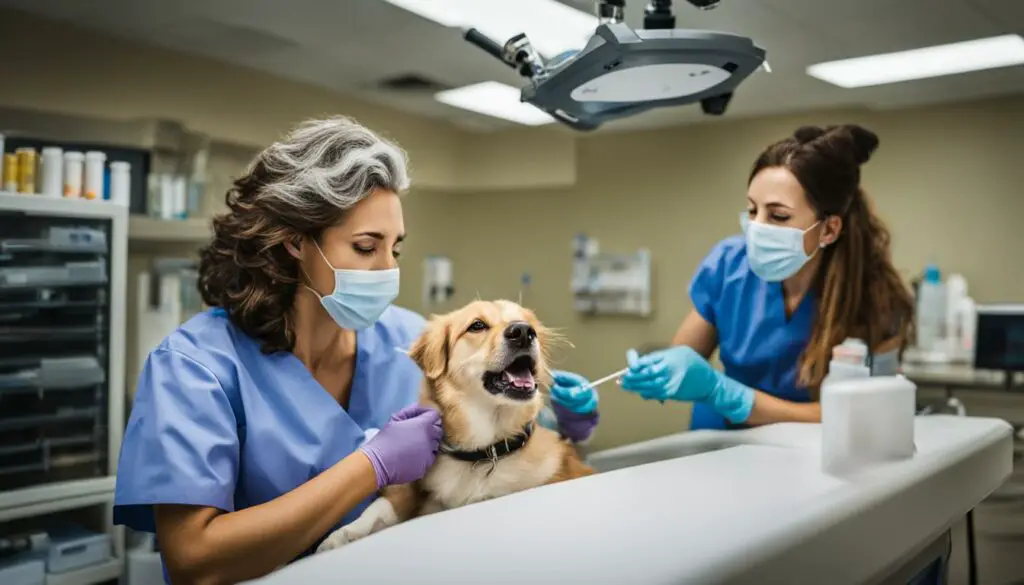
Table: Summary of Veterinary Treatment Options
| Type of Rat Poison | Treatment Options |
|---|---|
| Anticoagulant Rodenticides (e.g., brodifacoum, warfarin) | Vitamin K1 supplementation, blood transfusion if necessary |
| Cholecalciferol (Vitamin D3) | IV fluids, medications to regulate calcium levels |
| Bromethalin | Measures to control brain swelling, symptom management |
| Phosphides (zinc, aluminum) | Vomiting or stomach pumping to remove toxic gases |
Prognosis and Recovery for Dogs that Ate Rat Poison
When a dog ingests rat poison, the prognosis and recovery depend on several factors. The type and amount of poison consumed, as well as the promptness of treatment, play a significant role in determining the outcome. With immediate veterinary care, the survival rate for dogs that have ingested rat poison can be high.
Early detection and treatment are crucial for a positive outcome. Regular monitoring, blood tests, and follow-up treatments may be necessary for a complete recovery. It’s important to consult with a veterinarian who can provide the best course of action based on the specific type of poison ingested by the dog.
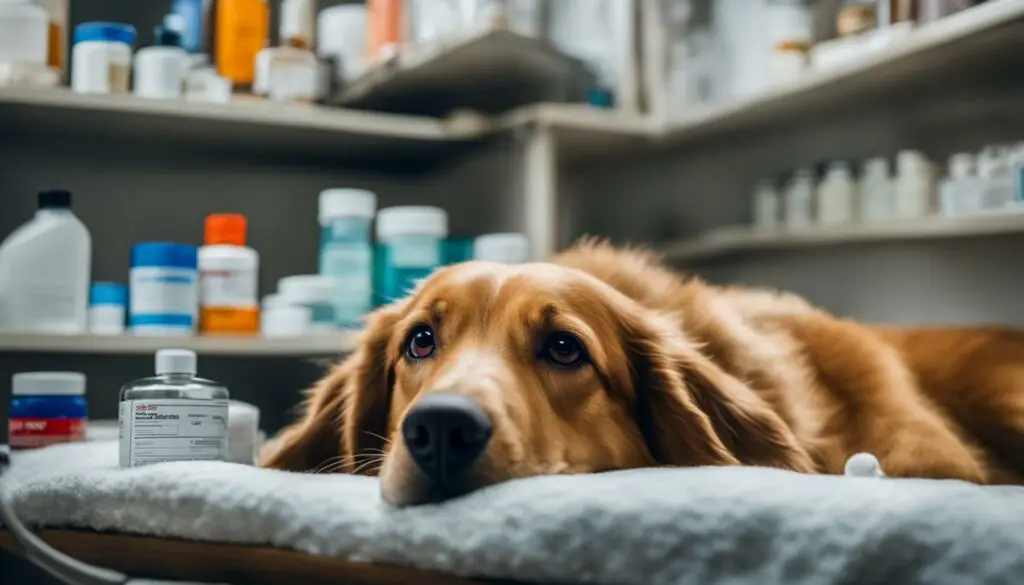
Factors Influencing Prognosis for Dogs that Ate Rat Poison
Several factors can affect the prognosis for dogs that have ingested rat poison:
- The type of rat poison: Different types of rat poisons have varying effects on dogs. Anticoagulant rodenticides interfere with blood clotting, cholecalciferol increases calcium levels, bromethalin causes brain swelling, and zinc/aluminum phosphides release toxic gases.
- The amount of poison ingested: The severity of the poisoning can depend on the quantity of rat poison consumed by the dog. Higher doses may lead to more severe symptoms and complications.
- The timeframe since ingestion: Rapid treatment can significantly improve the prognosis. Delayed intervention may result in more severe health issues and a more challenging recovery process.
With the right veterinary care and a proactive approach, dogs that have ingested rat poison can have a positive prognosis and recovery. However, pet owners should remember the importance of prevention to ensure their dogs’ safety and well-being.
| Type of Rat Poison | Effects on Dogs |
|---|---|
| Anticoagulant rodenticides (e.g., brodifacoum, warfarin) | Interfere with blood clotting, leading to internal bleeding |
| Cholecalciferol (vitamin D3) | Increases calcium levels, causing organ damage |
| Bromethalin | Swells the brain, resulting in seizures and paralysis |
| Zinc and aluminum phosphides | Release toxic gases in the stomach, causing bloating, pain, and liver damage |
“Early detection and treatment greatly increase the chances of a positive outcome for dogs that have ingested rat poison.”
Preventing Rat Poison Exposure to Dogs
Dogs are curious creatures, and it’s essential to take proactive measures to prevent them from being exposed to rat poison. By implementing some simple strategies, you can ensure the safety of your furry friend and minimize the risk of accidental ingestion.
Securing Rat Poison
The first step in preventing rat poison exposure is to store it securely in locations where dogs cannot access it. Ensure that containers are tightly sealed and stored out of reach, preferably in locked cabinets or high shelves. If you’re using rat poison in your home, keep a detailed record of where and when it’s placed, so you can promptly remove any remnants once the infestation is under control.

Informing Others
Whether you’re traveling or relying on a pet sitter, it’s crucial to inform them about the potential hazards of rat poison. Provide clear instructions on how to keep your dog safe, emphasizing the importance of vigilance and prevent them from accessing any unknown substances. Sharing information and educating those responsible for your dog’s well-being can greatly reduce the chances of accidental rat poison ingestion.
Pet-Proofing Your Home
Another crucial aspect of preventing rat poison exposure is to pet-proof your home. Identify and secure any products or substances that may pose a risk to your dog’s health. This includes not only rat poison but also cleaning supplies, medications, and other potentially toxic substances. Keep them safely stored away or use childproof locks to prevent your dog from accessing them. Regularly check your home for any potential hazards and make adjustments as needed to ensure a safe environment for your furry companion.
By being proactive and taking necessary precautions, you can protect your dog from the dangers of rat poison. Remember to secure the poison, inform others about potential hazards, and pet-proof your home. These simple steps can go a long way in keeping your furry friend safe and healthy.
The Dangers of Secondary Poisoning
Secondary poisoning can pose a threat to dogs that have ingested rat poison. This occurs when a dog consumes a rodent that has previously consumed rat poison. While less common, it is important to be aware of the potential risks associated with secondary poisoning.
When a rodent consumes rat poison, the toxins can remain in its system. If a dog then eats the poisoned rodent, it can be exposed to these toxins, leading to potential health complications. Secondary poisoning can occur through predation, as the toxins can pass on to other animals in the food chain.
If you suspect that your dog has experienced secondary poisoning, it is crucial to seek veterinary evaluation and guidance. Your vet can assess the situation and determine the best course of action. They may perform tests to confirm the presence of toxins and provide appropriate treatment.
Takeaway:
Secondary poisoning can occur when a dog consumes a rodent that has previously ingested rat poison. It is essential to be vigilant and prevent your dog from consuming rodents in areas where rat poison may have been used. If you suspect that your dog has been exposed to secondary poisoning, consult your vet for further evaluation and guidance.
Identifying Rat Poison and Providing Information to the Vet
When your dog has ingested rat poison, it is crucial to quickly identify the specific type of poison they have consumed in order to provide the appropriate treatment. While it can be challenging to determine the exact poison, bringing a sample of the substance and its packaging to your vet can help in the identification process. Additionally, providing as much information as possible about the source of poisoning can assist your vet in making an accurate diagnosis and developing a suitable treatment plan.
By bringing in a sample of the poison, your vet can conduct tests and analysis to identify the active ingredients and their potential effects on your dog’s health. This information will guide their treatment decisions and help ensure the best possible outcome for your furry friend.
During your vet visit, be prepared to answer questions regarding your dog’s behavior, potential exposure to rat poison, and any observed symptoms. The more details you can provide, the better equipped your vet will be to assess the situation and provide appropriate care.

Importance of Early Veterinary Intervention
When your dog ingests rat poison, time is of the essence. Seeking immediate veterinary care is crucial to ensure the best possible outcome for your furry friend. Acting proactively rather than waiting for symptoms to develop can prevent complications and potentially save your dog’s life.
Delaying veterinary intervention can lead to more severe health issues and a more challenging recovery process. Even if your dog appears fine initially, it’s important to remember that some symptoms may not appear for a day or even up to a week after ingestion. By seeking early treatment, you give your dog the best chance at a positive prognosis and a faster recovery.
Emergency vet care is essential when it comes to rat poisoning. Do not wait for symptoms to manifest before contacting a veterinarian. Immediate intervention can include measures such as inducing vomiting, administering activated charcoal, or providing specific antidotes based on the type of poison ingested. Only a trained professional can accurately diagnose and provide the appropriate treatment for your dog’s specific situation.
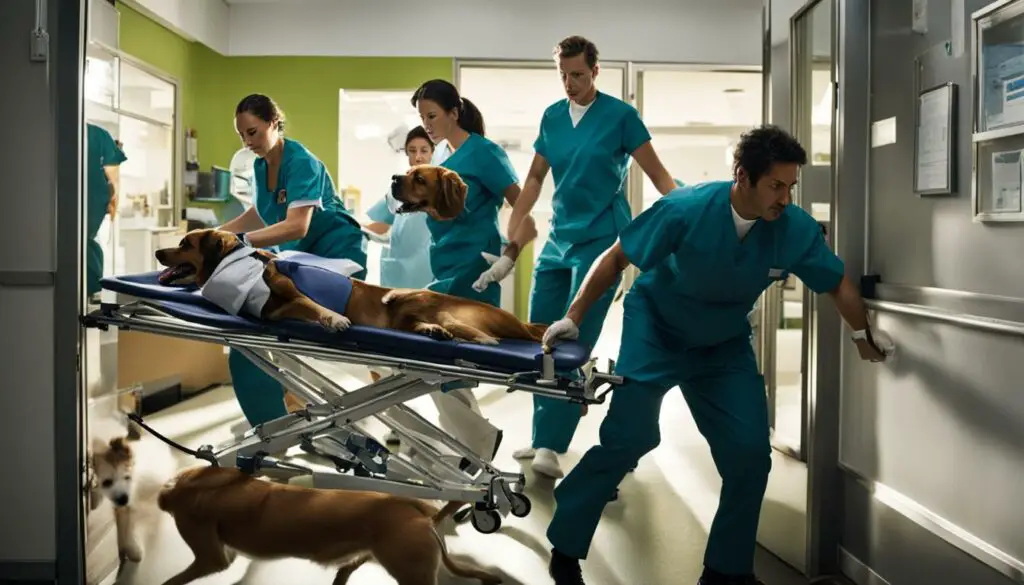
The Importance of Acting Swiftly
Seeking early veterinary intervention can make a significant difference in the outcome of rat poison ingestion cases. The sooner your dog receives appropriate care, the better their chances of a full recovery.
Remember, your pet’s safety and well-being should always come first. By prioritizing immediate veterinary care, you demonstrate your commitment to your dog’s health and give them the best fighting chance against the dangers of rat poisoning.
Testing and Diagnosis for Rat Poison Ingestion in Dogs
When it comes to rat poison ingestion in dogs, prompt testing and diagnosis are crucial for effective treatment and ensuring the best possible outcome. Veterinarians employ various diagnostic procedures to identify the specific toxin and its effects on your dog’s health.
During the examination, your vet will assess your dog’s symptoms and may perform blood tests to detect abnormalities or changes in clotting factors. Additionally, they may analyze samples such as stomach contents, vomit, or urine to confirm the presence of certain toxins. These diagnostic procedures help guide appropriate treatment and ensure the most effective course of action.
It’s important to remember that there isn’t a single test that can determine the exact rat poison ingested. However, through careful analysis and evaluation, your vet can provide valuable insights and tailored treatment plans based on the specific circumstances.
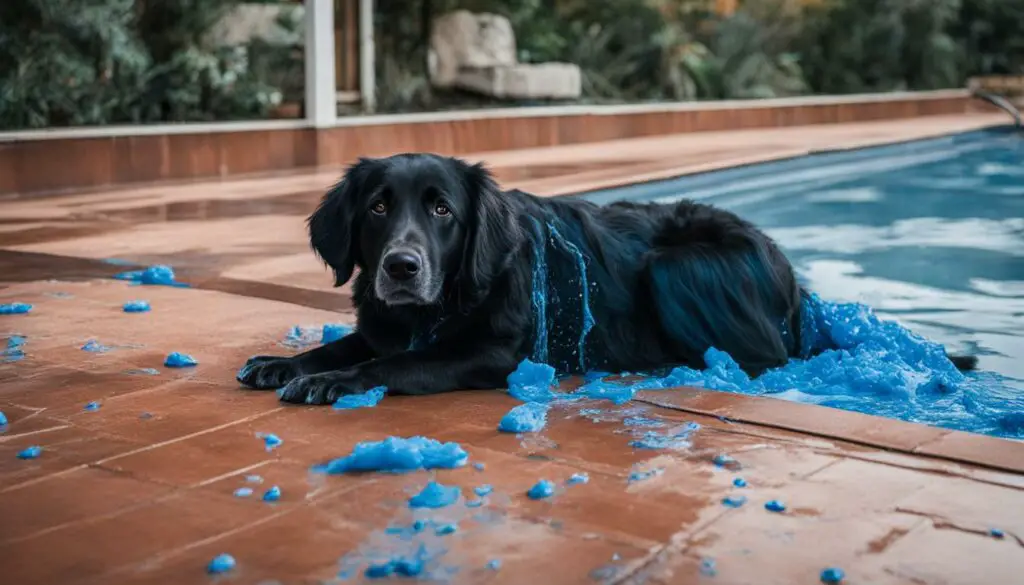
While waiting for test results, it’s crucial to provide your dog with prompt veterinary care and follow any recommendations provided. Early intervention significantly increases the chances of a positive outcome and helps minimize potential complications.
Professional Poison Control Resources
When your dog ingests rat poison, it’s crucial to seek immediate professional guidance and support. Professional Poison Control resources offer valuable assistance in these situations, providing expert advice to help you navigate through the emergency. By contacting Poison Control at 1-800-222-1222, you can access expert guidance and support from a team of toxicology specialists.
If you prefer online assistance, webPOISONCONTROL® is an excellent resource. Their online tool allows you to assess the poisoning situation and receive accurate recommendations within minutes. Whether you choose to contact Poison Control by phone or use the webPOISONCONTROL® online tool, you can count on receiving confidential guidance tailored to your specific circumstances.
Expert Advice at Your Fingertips
By reaching out to Poison Control, you can gain access to a wealth of knowledge and expertise. The experienced poison control specialists are trained to handle a variety of poisoning cases, including rat poison ingestion in dogs. They will provide step-by-step instructions on what to do next, helping you take the necessary actions to protect your dog’s health.
“Contact Poison Control immediately at 1-800-222-1222 or use the webPOISONCONTROL® online tool for expert and confidential guidance.”
Remember, when it comes to rat poison ingestion in dogs, time is of the essence. Acting swiftly, in consultation with a professional poison control resource, can make a significant difference in your dog’s outcome.

Ensuring Safe Environments for Dogs
When it comes to keeping our furry friends safe and sound, pet-proofing our homes is of utmost importance. Creating a secure environment for our dogs not only prevents accidents but also helps to ensure their overall well-being. By taking a few simple steps, we can significantly reduce the risk of our beloved pets encountering potential dangers, such as rat poison.
One of the first steps in pet-proofing our homes is to secure hazardous products and substances. Keep cleaning supplies, chemicals, and medicines safely stored in cabinets or drawers that are out of your dog’s reach. It’s also important to be mindful of household plants, as some can be toxic to dogs if ingested. Make sure to research which plants are safe and remove any that pose a risk.
When it comes to outdoor spaces, supervision is key. Dogs love to explore, so it’s essential to keep a watchful eye on them, especially in areas where rodenticides may be present. If you live in an area where rat poison is frequently used, consider using alternative methods for pest control that are safe for pets. Additionally, always be cautious when visiting parks or public areas and be aware of any potential hazards that may be present.
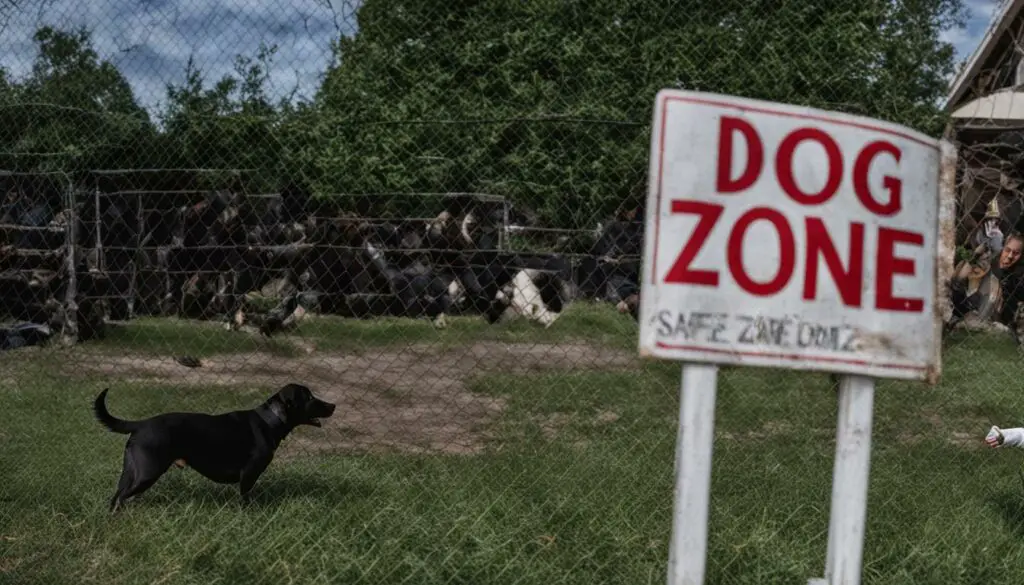
Creating a Pet-Friendly Home
Creating a pet-friendly home goes beyond pet-proofing. It’s about ensuring that our dogs have a comfortable and enriching environment. Providing them with their own designated spaces, such as a cozy bed or a play area, can help them feel secure and relaxed. It’s also important to provide them with plenty of toys and mental stimulation to keep them entertained and prevent destructive behaviors.
Remember, prevention is always better than cure. By taking the necessary precautions and creating a safe environment, we can protect our dogs from potential dangers and ensure their well-being for years to come.
| Tips for Dog Safety and Prevention | |
|---|---|
| 1 | Secure hazardous products and substances. |
| 2 | Remove toxic plants from your home. |
| 3 | Supervise your dog in outdoor spaces. |
| 4 | Consider alternative pest control methods. |
| 5 | Provide designated spaces and toys for your dog. |
Financial Protection for Your Dog’s Health
If your dog has ingested rat poison, seeking immediate veterinary care is crucial for their well-being. However, the cost of vet bills can quickly add up, putting a strain on your finances. That’s why it’s important to consider obtaining dog insurance to provide financial protection in case of unexpected accidents or illnesses, including cases of rat poison ingestion.
I never realized how quickly vet bills could accumulate until my dog ate rat poison. The emergency care, diagnostic tests, and treatments were all necessary but expensive. Thankfully, I had dog insurance from Pumpkin Pet Insurance to help cover the costs. It provided me with peace of mind knowing that my furry friend was receiving the best care without the burden of high expenses.
Pumpkin Pet Insurance offers comprehensive plans that can cover up to 90% of your vet bills, ensuring that your dog receives the necessary medical care without breaking the bank. From emergency visits to specialized treatments, having insurance can significantly alleviate the financial stress during challenging times.
Benefits of Dog Insurance:
- Financial protection: Dog insurance helps protect you from unexpected vet bills, including those resulting from rat poison ingestion.
- Peace of mind: With insurance, you can make decisions based on what’s best for your dog’s health without worrying about the cost.
- Flexible coverage options: Pumpkin Pet Insurance offers customizable plans to fit your budget and your dog’s specific needs.
- Convenient claims process: Submitting claims online is quick and easy, allowing you to focus on your dog’s recovery.
Request a free quote from Pumpkin Pet Insurance to explore coverage options and ensure that you have the financial assistance needed to protect your dog’s health in case of emergencies like rat poison ingestion.
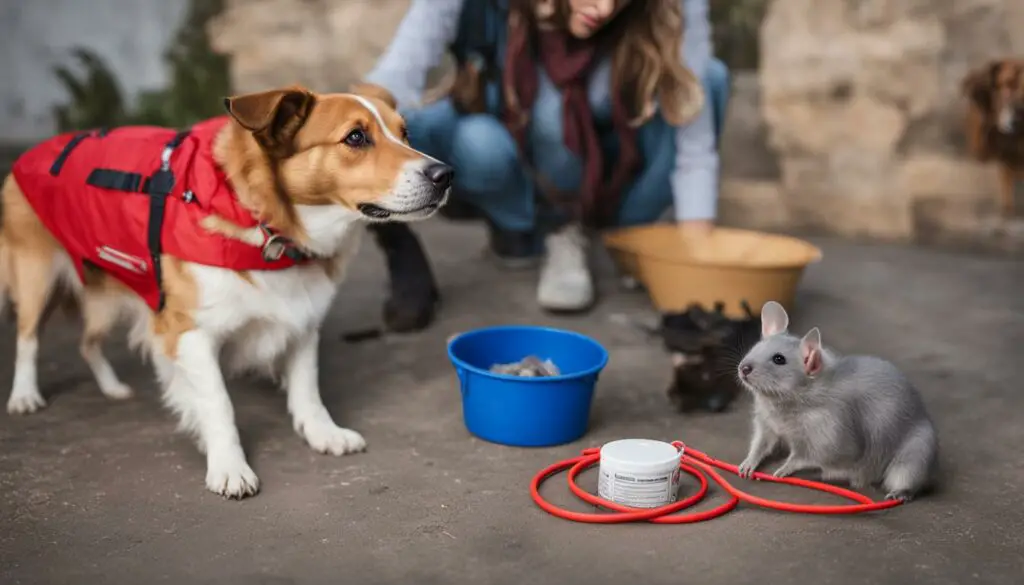
Conclusion
When your dog consumes rat poison, it’s essential to act swiftly to protect their well-being. Contact Poison Control immediately at 1-800-222-1222 or utilize the webPOISONCONTROL® online tool for expert guidance. If your dog experiences collapse, difficulty breathing, seizures, or unresponsiveness, call 911 for immediate assistance. Remember, prompt professional attention is crucial in these situations.
Be vigilant for signs of rat poison ingestion in dogs, as symptoms may not be immediate. Look out for lethargy, pale gums, lack of appetite, muscle weakness, coordination issues, vomiting, increased thirst, seizures, or paralysis. These symptoms can manifest up to a week after ingestion, so it’s important to remain watchful.
There are various types of rat poisons, each with its own effects on dogs. Anticoagulant rodenticides can interfere with blood clotting, leading to internal bleeding. Cholecalciferol or vitamin D3 can cause organ damage by increasing calcium levels. Bromethalin can result in brain swelling, seizures, and paralysis. Zinc and aluminum phosphides release toxic gases, causing bloating, pain, and liver damage. Knowing the type of rat poison ingested is vital for appropriate treatment.
Immediate actions should be taken if your dog ingests rat poison. Remove your pet from the source and ensure they cannot access it again. Contact the Animal Poison Control Center or your vet for guidance, providing details about the specific poison involved. If necessary, seek emergency veterinary care for immediate treatment. Avoid inducing vomiting or using home remedies without professional advice, as these can worsen the situation.
FAQ
What should I do if my dog ate rat poison?
If your dog has ingested rat poison, it’s crucial to act quickly to protect their health. Contact Poison Control immediately at 1-800-222-1222 or use the webPOISONCONTROL® online tool for expert and confidential guidance. In case of collapse, difficulty breathing, seizures, or unresponsiveness, call 911. Prompt professional assistance is vital in these situations.
What are the signs of rat poison ingestion in dogs?
Dogs that have consumed rat poison may not show immediate symptoms. It’s important to be vigilant and look for signs such as lethargy, pale gums, lack of appetite, muscle weakness, coordination issues, vomiting, increased thirst, seizures, or paralysis. These symptoms may not appear for a day or even up to a week after ingestion.
What are the types of rat poisons and their effects on dogs?
Rat poisons can contain different active ingredients, each with its own effects on dogs. Anticoagulant rodenticides, such as brodifacoum and warfarin, interfere with blood clotting and can lead to internal bleeding. Cholecalciferol or vitamin D3 increases calcium levels, causing damage to organs. Bromethalin swells the brain and can result in seizures and paralysis. Zinc and aluminum phosphides release toxic gases in the stomach, leading to bloating, pain, and liver damage.
What immediate steps should I take when my dog eats rat poison?
If your dog ingests rat poison, remove them from the source and ensure they cannot access it again. Check their behavior and look for any symptoms. Contact the Animal Poison Control Center at 1-800-213-6680 or your vet for guidance. Provide details about the type of rat poison ingested. If necessary, take your dog to an emergency vet clinic for immediate care. Do not induce vomiting or try home remedies without professional advice.
What veterinary treatment is required for rat poison ingestion in dogs?
Treatment for rat poison ingestion in dogs varies depending on the type of poison and the timeframe since ingestion. The vet may induce vomiting and administer activated charcoal for recent ingestion. For anticoagulant rodenticides, dogs may need vitamin K1 supplementation and possibly a blood transfusion. Cholecalciferol poisoning requires extensive medical care, including IV fluids and medications. Bromethalin may require brain swelling control. Phosphide poisoning may involve vomiting or stomach pumping.
What is the prognosis for dogs that have ingested rat poison?
The prognosis for dogs that have ingested rat poison depends on various factors, including the type and amount of poison, and how quickly treatment is initiated. If prompt veterinary care is provided, the survival rate can be high. Regular monitoring, blood tests, and follow-up treatments may be necessary for a complete recovery. Early detection and treatment greatly increase the chances of a positive outcome.
How can I prevent rat poison exposure to my dog?
The best way to prevent your dog from being exposed to rat poison is to keep it out of their reach. Store rat poison in secure locations where dogs cannot access it. If you’re using rat poison in your home, keep careful records of where and when it’s placed to minimize the risk. When traveling or using a pet sitter, inform them about potential hazards and provide instructions to keep your dog safe. Pet-proof your home by securing dangerous substances and products.
What are the dangers of secondary poisoning?
Dogs can experience secondary poisoning if they eat a rodent that has consumed rat poison. This is less common but can occur. The toxins can remain in the animal’s system and potentially pass on to other animals through predation. If you suspect this has occurred, contact your vet for further evaluation and guidance.
How can I identify rat poison and provide information to the vet?
It can be challenging to identify the specific type of rat poison your dog has ingested. Bringing a sample of the poison and its packaging to the vet can help in identification and appropriate treatment. If you are uncertain about the source of poisoning, provide as much information as possible to your vet for accurate diagnosis and treatment.
Why is early veterinary intervention important in cases of rat poison ingestion?
When it comes to rat poisoning, acting quickly and seeking veterinary care is essential. Don’t wait for symptoms to develop before contacting a vet. Even if your dog appears fine, immediate veterinary intervention can prevent complications and save their life. Delayed treatment can lead to more severe health issues and a more challenging recovery process.
How is testing and diagnosis done for rat poison ingestion in dogs?
There isn’t a single test to determine which specific rat poison your dog has ingested. Your vet will assess the symptoms, perform blood tests, and may analyze samples such as stomach contents, vomit, or urine. These diagnostic procedures can help confirm the presence of certain toxins and guide appropriate treatment.
Where can I find professional poison control resources?
Poison Control services offer valuable assistance in cases of suspected rat poison ingestion. Contact Poison Control immediately at 1-800-222-1222 for expert guidance and support. In addition, webPOISONCONTROL® provides an online tool to help assess poisoning situations and receive accurate recommendations within minutes.
How can I ensure safe environments for my dog?
Apart from preventing access to rat poison, it’s essential to create a safe environment for your dog. Pet-proof your home by securing hazardous products and substances. Supervise your dog when outside, especially in areas where rodenticides may be present. Regularly communicate with your vet about potential risks and prevention strategies tailored to your specific circumstances.
Can I obtain financial protection for my dog’s health?
Consider obtaining dog insurance to provide financial protection in case of unexpected accidents or illnesses, including cases of rat poison ingestion. Pumpkin Pet Insurance offers plans that can cover up to 90% of your vet bills, ensuring that your dog receives the necessary medical care without the burden of high costs. Request a free quote to explore coverage options.

